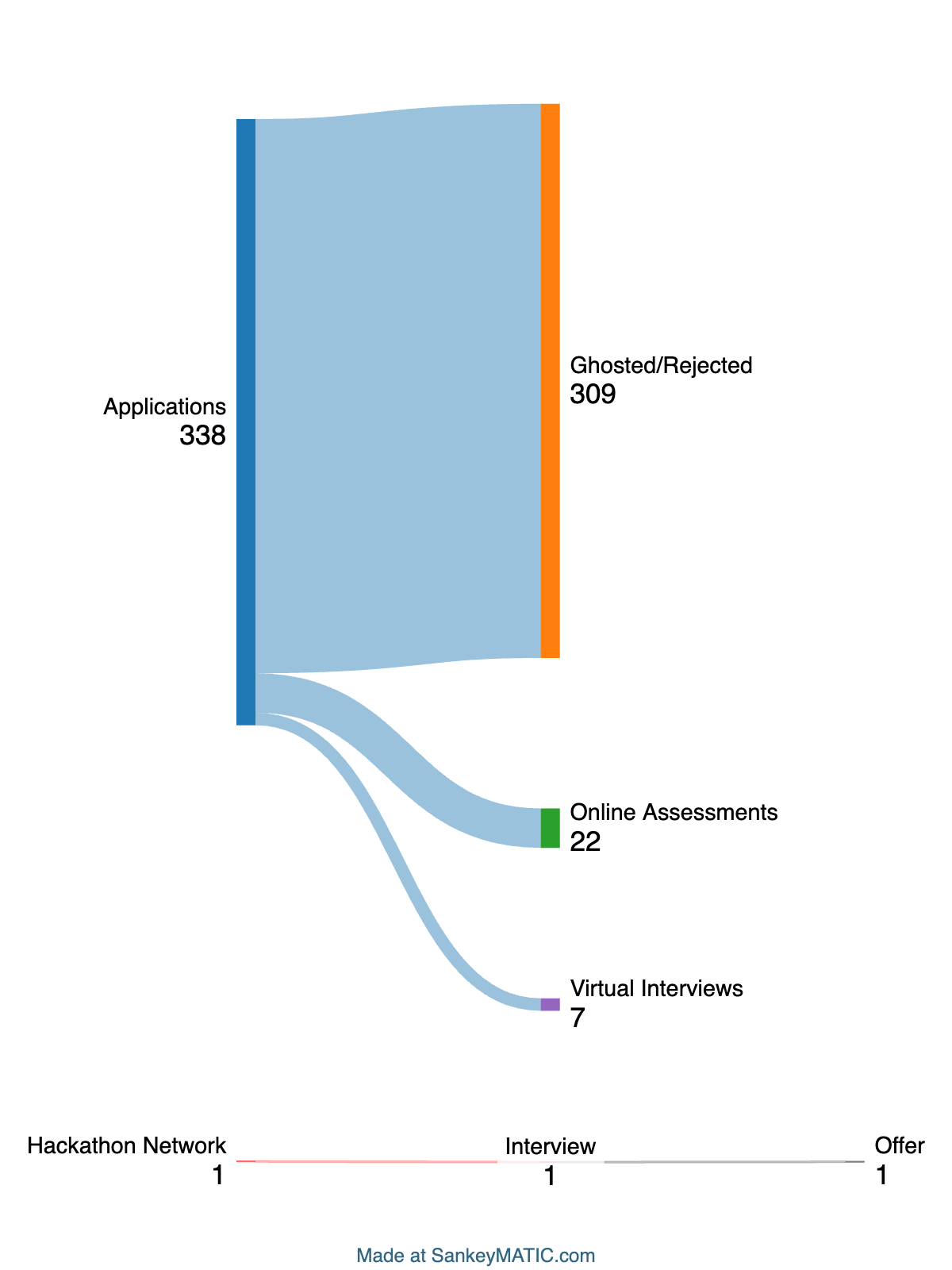One week before Hack the North, I received an email from TD Bank expressing interest in conducting an onsite interview. The timeline moved quickly: a phone call on Monday, September 8th, confirmation on Thursday, and an interview scheduled for 6pm on Saturday, September 14th—right in the middle of the hackathon weekend.
To understand why this mattered so much: I had been applying to internships since the summer of 2024. Not just casually—I'm talking hundreds of applications. The result? Absolutely nothing. No interviews. Just rejections. I managed to get a handful of online assessments (OAs), but even those were few and far between. This wasn't just my first informal interview—this was my first interview, period. Every other door had been slammed shut before I even got a chance to speak to a real person.

My application journey: 338 total applications, 22 online assessments, 7 virtual interviews, and ultimately 1 offer through the hackathon network.
The interview itself was surprisingly informal. The interviewer opened by mentioning that my resume was impressive, and what followed was more of a conversation than a traditional interview. He spent most of the time discussing the team dynamics, their tech stack, and asking about my expectations from TD Bank. Honestly, he talked more than I did, which was unexpected but refreshing. It felt more like getting to know a potential colleague than being evaluated.
After the interview, I felt confident about my chances, though I tried not to get ahead of myself. I didn't want to jinx anything, so I returned to the hackathon and tried to stay focused on the event.
Sunday afternoon around 3pm, I was at Wilfrid Laurier University with my friend Zach, waiting for the closing ceremony. My phone rang—it was TD Bank. They verbally extended the offer right there on the call. I responded with a simple "thank you," probably with less emotion than expected. It wasn't that I wasn't excited; I genuinely didn't know how to react in that moment. My brain just blanked.
Reflecting on the experience, a few things stand out. First, the resume mattered—he explicitly mentioned it. All those projects, hackathons, and side builds were noticed. Second, the timing worked in my favor. Interviewing during Hack the North demonstrated active involvement in the tech community and a commitment to building. Third, authenticity played a role. I didn't try to oversell myself or claim expertise I didn't have. I focused on what I genuinely wanted to learn and contribute. Finally, the casual tone of the interview suggested they had already made up their minds. It was more about cultural fit than proving technical competence.
But here's what people don't see behind this success story. It didn't happen overnight. Behind every "overnight success" are years of invisible work, countless rejections, and moments of doubt that never make it into the highlight reel.
Hack the North 2024 was actually my first hackathon, but I went as a volunteer, not a hacker. Since then, I've done 4 hackathons as a hacker, 2 as a mentor, and 1 as a judge. I've never won anything from any of them. Not a single prize. But I made friends, built connections, and collected enough free swag to fill a small room.
While others were relaxing, I was constantly building. uoguelph.courses, Octree, full-stack development work at UoG. I was always working on something. The projects weren't always perfect, but they were real, and they showed I could ship code.
Here's where it gets interesting. I cross-enrolled at the University of Waterloo while being a full-time student at the University of Guelph. Just to be a Waterloo student. I literally put my UW student ID on my Hack the North 2025 application. I'm probably the first person in this country to do something this ridiculous: taking courses at another university solely to expand my hackathon opportunities, networking and just to put the name Waterloo on my resume lol.
Hack the 6ix 2024 and 2025. UofTHacks. DeltaHacks. UOttawaHacks. All the big hackathons. All rejections. Every single one. I applied to everything, got rejected from most, and kept showing up anyway.
For anyone working toward their first internship, here's what I'd recommend: Build projects that genuinely interest you, not just ones that look good on paper. Show up to events and engage with the community—you never know who's paying attention. Stay authentic in interviews; companies can tell when you're being genuine versus rehearsed. And don't overthink the moments that matter. I completely blanked when I got the offer, and that's okay. Sometimes the best response is simply gratitude.
Success isn't about avoiding failure—it's about failing forward. Every rejection taught me something. Every hackathon I didn't win gave me experience. Every late night building a project that nobody used made me a better developer. The path to success isn't linear, and it's definitely not pretty. But if you keep building, keep showing up, and keep pushing boundaries (even ridiculous ones like cross-enrolling at another university), eventually the pieces fall into place.
This will be my first real internship, and I'm looking forward to what I'll learn, the team I'll work with, and the problems I'll get to solve. If there's one takeaway from this experience, it's that consistency matters. Keep building, keep showing up, and stay true to yourself. That's what worked for me.